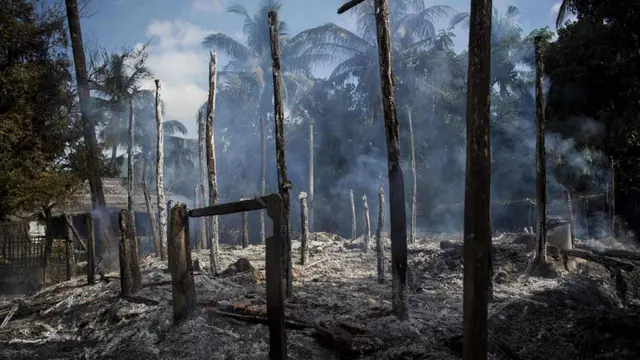Myanmar’s de facto leader Aung San Suu Kyi said Thursday that her government is following the law in dealing with the situation in Rakhine state, where police have reportedlybeaten and rapedminority Rohingya Muslims.
Her statement came one day after the US called for restoration of full humanitarian access to the strife-hit region of western Myanmar where the United Nations says more than 150,000 people are being denied aid.
Suu Kyi, who holds the titles of state counsellor and foreign minister, is on a five-day visit to Japan.
Suu Kyi, in a meeting in Tokyo with Japanese Foreign Minister Fumio Kishida, said the Rakhine issue is extremely delicate and must be handled with care, according to a summary released by Japan’s Foreign Ministry.
She told Kishida that the Myanmar government is responding to the situation based on the principle of the rule of law, the ministry said.
She has also not directly commented on calls from human rights experts urging the government to investigate the allegations of abuse, or on statements from human rights monitors, although she has urged the military to act with restraint.
“The problem inRakhine stateis extremely delicate and care is needed in responding,” Suu Kyi was quoted as saying.
“The Myanmar government is responding to the issue of Rakhine state based on the principles of the rule of law.”
Human rights groups and Asian parliamentarians have raised alarm over a three-week surge in violence by security forces in Rakhine, home to many Rohingya. The violence followed the killings of nine police officers at border posts on October 9.
“The reports coming out of Myanmar’s Rakhine State are alarming and demand a credible investigation ... All authorities must take urgent action to prevent further violations and fulfil their responsibility to protect the rights of all civilians,” said Asean Parliamentarians for Human Rights (APHR) Chairperson Charles Santiago, a member of the Malaysian parliament.
Japan’s Kishida also said violence should not be permitted, and that he welcomes efforts toward peace and stability in the region. He added that Japan would support those efforts by donating a new ship, on top of two used boats and food aid given earlier for displaced people.
The military operation has sharpened the tension between Suu Kyi’s six-month-old civilian administration and the army, which ruled the country for decades and retains key powers, including control of ministries responsible for security.
While Myanmar’s army-drafted constitution puts the military firmly in control of security matters, diplomats and aid workers say privately they are dismayed at Suu Kyi’s lack of deeper involvement in the handling of the crisis.
Suu Kyi received an honorary doctorate from Kyoto University for “advancement of democracy in Myanmar and in the world as a whole”, telling Japanese students and Myanmar citizens that difficulties in negotiating peace between armed ethnic groups stemmed from a lack of belief.
“Unity and diversity is not something that can be implemented just because you want to implement it,” Suu Kyi said in response to a question at a discussion at the university, where in the mid-1980s she researched her father, independence hero Aung San. She was not asked directly about the Rohingya.
“It is a long process. It takes a lot of patience,” she added, without referring to Rakhine. “We believe this is possible.”
The Rohingya are seen by many Myanmar Buddhists as illegal immigrants from Bangladesh. Some 125,000 remain displaced and face severe travel restrictions in squalid camps since fighting erupted in Rakhine between Buddhists and Muslims in 2012.
(SCMP)
 简体中文
简体中文

